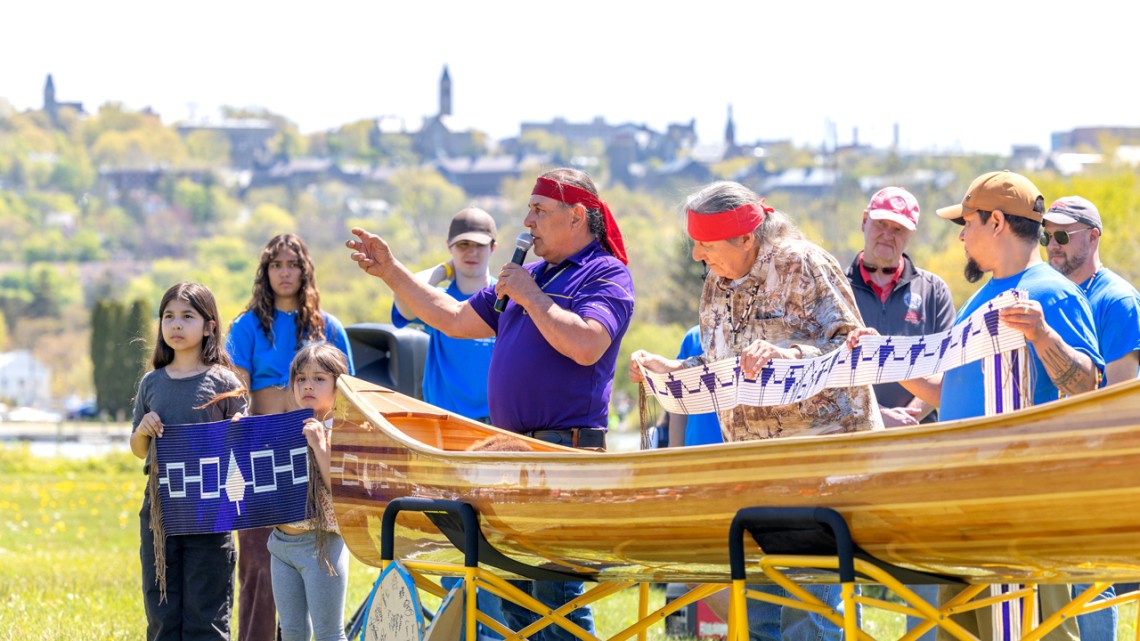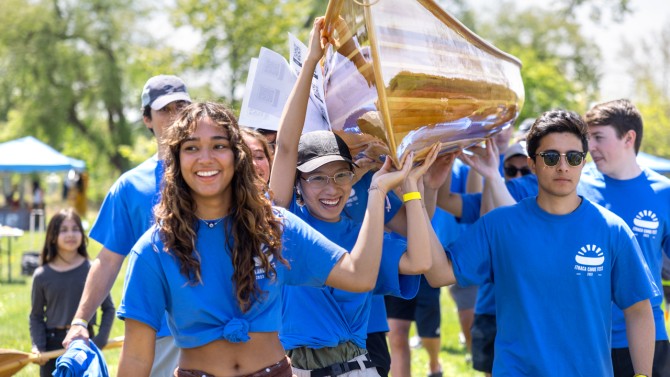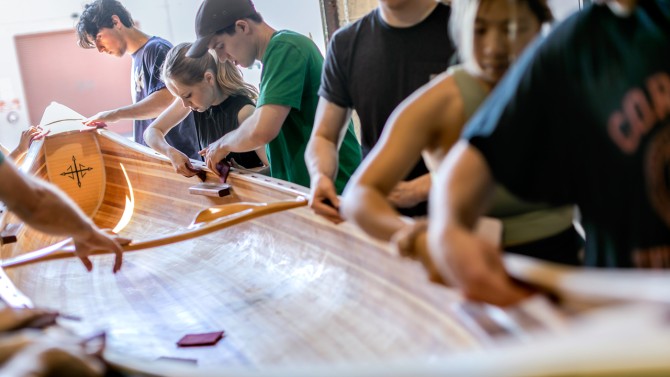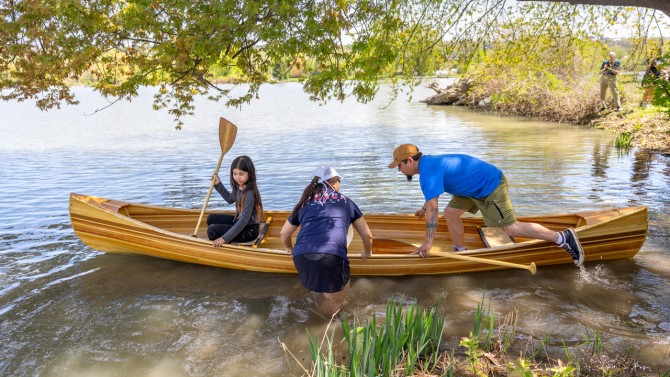
Jake Edwards gives introductory remarks during the canoe dedication ceremony at Cass Park.
Students donate handmade canoe to Haudenosaunee youth
By Alison Fromme
On May 7, Cornell students presented a handmade canoe to Hickory Edwards, Onondaga Nation Turtle Clan member and founder of the Haudenosaunee Canoe Journey, a program that guides Indigenous youth through ancestral waterways in upstate New York. More than 500 people from Cornell, the greater Ithaca area and neighboring Indigenous communities gathered to witness the ceremony at the inaugural Canoe Fest in Ithaca’s Cass Park.
“The canoe is a symbol of strength and connection to the waterways, and it has held great significance for many Indigenous cultures, including the ones joining us today. It is a vessel that has carried people across the waters for centuries and connected many communities,” said Celine Santana ’23, one of the 28 students who built the canoe and organized Canoe Fest.
“I can’t express how grateful I am for this canoe,” Edwards said standing next to his 10-year-old daughter, EllieRose, who will join the 13-day, 150-mile journey from Seneca Lake to the Mohawk River this summer. “This is for our next generation.”
Canoe Fest was the culmination of the Outdoor Recreation Economy class taught by Trent Preszler, visiting professor of practice in management and organizations in the Cornell SC Johnson College of Business. Over the course of the semester, students built the canoe, participated in discussions about racial and economic inequities, and planned Canoe Fest with community partners.
The class was part of the Grand Challenges Program at the Charles H. Dyson School of Applied Economics and Management, where students engage with other organizations to work toward United Nations Sustainable Development Goals, such as safeguarding cultural heritage.
“We have a unique way of approaching business education,” said Jinhua Zhao, the David J. Nolan Dean of the Dyson School and professor of applied economics and policy. “We educate future leaders who not only have strong business skills, but also use those skills for the greater societal good. These students are examples of our approach.”
The canoe
At the beginning of the semester, Edwards visited the class in the boat building workshop, which was housed in a garage at the College of Veterinary Medicine, and offered a blessing.
“I told the students that when you’re building a boat, you’re putting yourself into this work and into the vessel,” said Edwards, who began canoeing when his uncle, Jake Edwards, told him to clean up trash that had collected in a nearby waterway. “This canoe is going to bring good thoughts over the land with us.”
Edwards started the Haudenosaunee Canoe Journey about a decade ago to create a stronger connection between Indigenous youth and ancestral waterways and to draw attention to environmental issues. “We do this to bring our Native people back to the earth, so that we can know ourselves,” he said.
That and the many other benefits that come from the outdoor recreation are not distributed equitably. A comprehensive survey by the U.S. National Park Service reported that 97% of people who participate in outdoor recreation are white. Throughout the semester, Preszler and his students discussed these racial inequities and explored sustainable business innovation in the outdoor recreation sector, which contributes $460 billion to the U.S. economy annually – more than agriculture and mining combined.
“The canoe is a crucible for so many issues: race relations, history, commerce, production of goods, sustainability,” Preszler said. “This class shows how business can be part of the solution and does not have to perpetuate past problems.”
Students followed canoe construction plans that originated with the Indigenous Abenaki peoples of the Northeast woodlands. For three hours every Friday afternoon, students convened at their Veterinary College garage-turned-boat-workshop and pieced together cedar strips, applied fiberglass, sanded and varnished, building the boat upside down on supports.
“The strips of wood are kind of plain and simple, but they are inherently stunning. Seeing the progress made each week really blew my mind,” said Sarah Rubin ’23, whose previous woodworking experience was limited to a middle school shop class.
One day after the glue had dried, the class was ready to turn the canoe right side up. Together, the students lifted the canoe off the forms and slowly flipped it upright. When they saw the inside, they fell silent, then erupted into spontaneous applause.
“It was a pivotal moment where we realized we actually built this,” Rubin said.
Canoe Fest
The students’ overarching goal for Canoe Fest was to showcase the canoe and introduce paddling sports to the Ithaca community, with intentional outreach to marginalized communities.
Working in teams of five to handle logistics, marketing and finance, the students developed a business plan for Canoe Fest and collaborated with three community partners: The History Center in Tompkins County, Finger Lakes Boating Museum and Ithaca Dragon Boat Club.
When students presented their business plan at the Grand Challenges Pitch Competition, they told the judges that they had built the boat to preserve the longstanding Indigenous tradition of boatbuilding and to forge lasting relationships with marginalized communities. They won first place and $2,500 to help launch Canoe Fest.
Throughout the process, they put business concepts into practice.
“This class taught me what it takes to actually do mission-driven work, engaging with different communities,” said Emily Xiao ’23, who will start a consulting job in Chicago after graduation. “We’ve had the time to appreciate the artistry of the canoe, to process the minutiae of it and see everything come together. Being able to promote awareness is so important.”
When the day of Canoe Fest finally arrived, community members had the opportunity to paddle canoes and Chinese dragon boats and partake in Native American dance, music, food and art. Jake Edwards, a member of the Onondaga Nation Eel Clan, welcomed attendees with a traditional Haudenosaunee thanksgiving address first spoken in the Onondaga language and then translated into English and later gave the crowd an in-depth lesson about Haudenosaunee history.
“It’s hard to believe that there are troubles in the world because there are so many people with good hearts out there,” Jake said in his concluding remarks. “It’s a matter of taking the time like you guys did today to just listen and participate in something that is good.”
After the gifting ceremony, students lifted the boat over their shoulders and carried it down to the water, where Hickory and his daughter climbed in. When they travel their ancestral route this summer, EllieRose will surpass 1,000 miles of paddling in her lifetime.
Alison Fromme is a writer for the SC Johnson College of Business.
Media Contact
Abby Kozlowski
Get Cornell news delivered right to your inbox.
Subscribe




